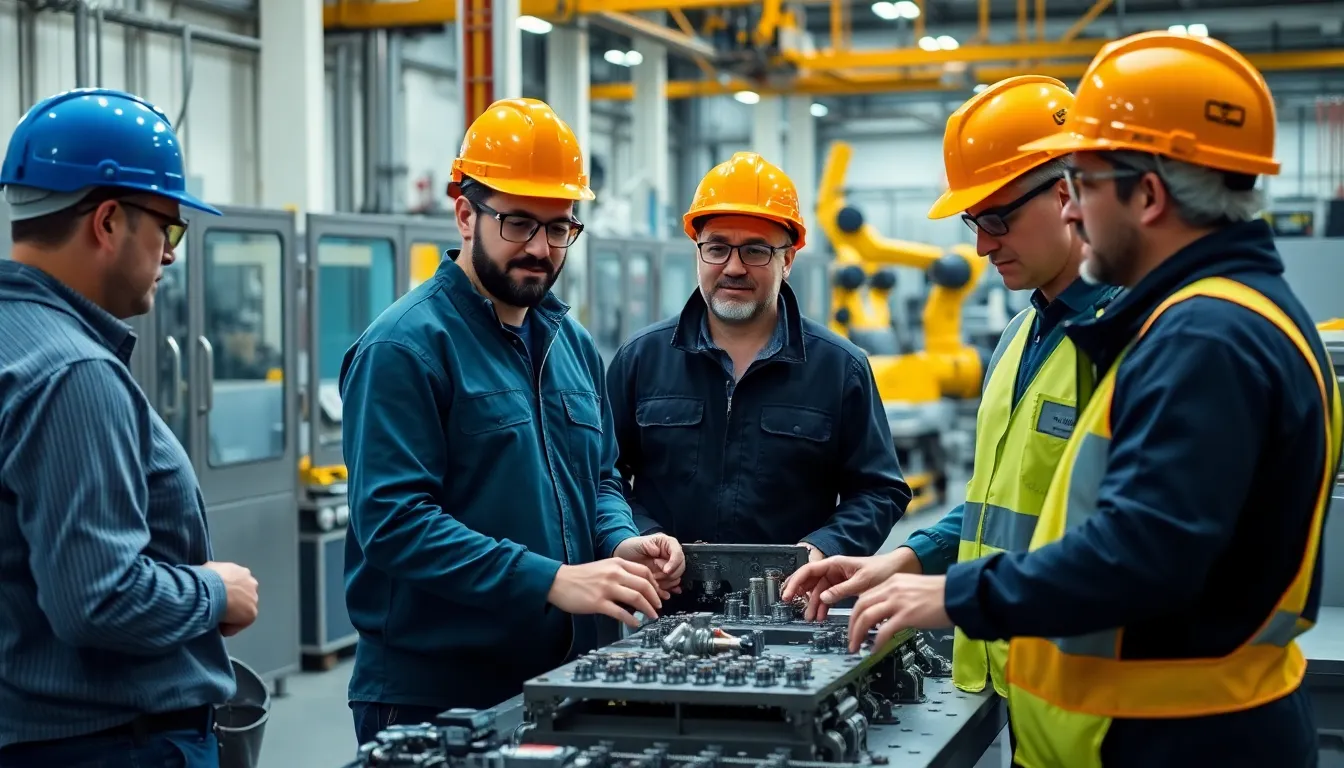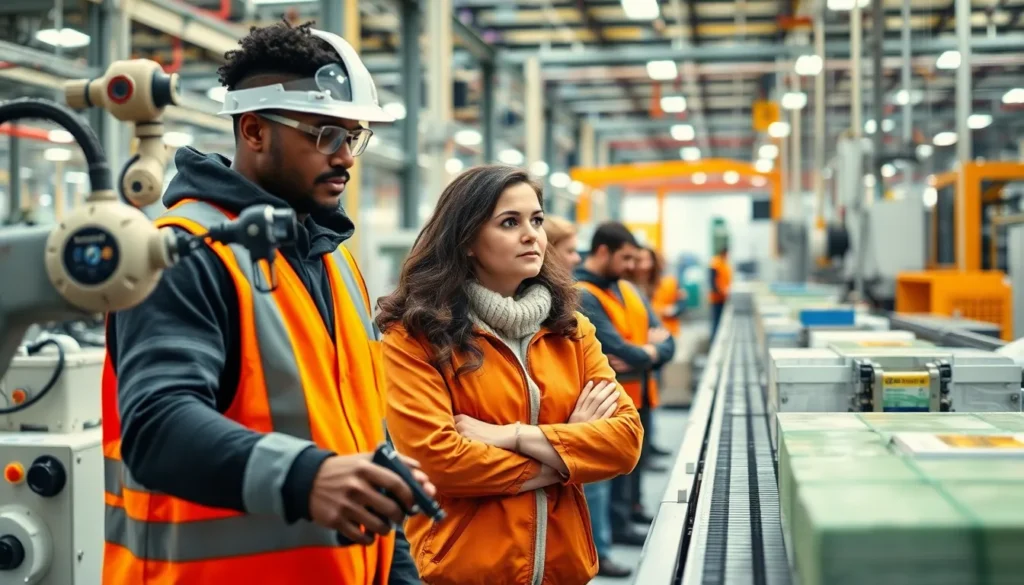Table of Contents
ToggleIn a world where robots might soon take over the dinner table, the manufacturing sector is evolving faster than a toddler can say “more juice.” From automation to sustainable practices, trends are reshaping how products are made, and they’re not just for the tech-savvy. Manufacturers are embracing innovations that promise efficiency, reduce waste, and even save a few bucks along the way.
As companies scramble to keep up, understanding these trends isn’t just a good idea—it’s essential. Whether you’re a seasoned pro or just dipping your toes in the manufacturing pool, staying informed can help navigate this dynamic landscape. Buckle up as we explore the trends that are not just changing the game but rewriting the rulebook altogether.
Overview of Manufacturing Sector Trends
Rapid advancements characterize the manufacturing sector. Automation leads the charge, with businesses increasingly implementing robotics and artificial intelligence. These technologies streamline production processes, enhancing efficiency and reducing operational costs.
Sustainable practices gain traction as companies prioritize eco-friendly solutions. Incorporating renewable energy sources and minimizing waste reduces environmental impact. Many organizations embrace circular economy principles, aiming to recycle materials and reduce resource consumption.
Digital transformation also plays a crucial role in modern manufacturing. The integration of the Internet of Things (IoT) enables real-time data collection and analysis. Manufacturers utilize this data for predictive maintenance, allowing for reduced downtime and optimized operations.
Another significant trend involves advanced materials. Innovations such as lightweight composites and smart materials improve product performance and sustainability. These materials often enhance durability while reducing weight, leading to cost savings and better energy efficiency.
Customization shifts become prevalent as customer preferences evolve. Many consumers demand personalized products, compelling manufacturers to adopt flexible production systems. This shift fosters deeper connections between brands and customers, driving loyalty and repeat business.
Adoption of Industry 4.0 concepts marks a transformative shift in manufacturing paradigms. This encompasses smart factories where interconnected systems facilitate seamless communication. These environments leverage data analytics for informed decision-making, further enhancing operational efficiency.
Staying informed about manufacturing sector trends is essential for industry players. Adapting to automation, sustainability, digital innovations, and advanced materials positions companies for success in a competitive landscape.
Key Drivers of Change

Numerous factors contribute to the ongoing evolution of the manufacturing sector. Understanding these drivers helps industry professionals navigate challenges and leverage opportunities.
Technological Advancements
Technological advancements play a crucial role in reshaping manufacturing. Automation, including robotics and artificial intelligence, increases efficiency and reduces labor costs. Smart technologies such as Internet of Things devices enhance real-time data collection and analysis. Predictive maintenance systems decrease downtime, allowing for smoother operations. Manufacturers also rely on advanced materials, like lightweight composites, to innovate products and improve sustainability.
Global Supply Chain Dynamics
Global supply chain dynamics significantly impact manufacturing processes. Changes in trade policies and tariffs affect sourcing and distribution strategies. Companies are increasingly adopting local sourcing to minimize risks associated with lengthy supply chains. Additional focus on agility and flexibility enables manufacturers to respond quickly to shifts in demand. Moreover, disruptions from global events underscore the need for resilience and adaptability in supply chain management.
Sustainability in Manufacturing
Sustainability plays a crucial role in the modern manufacturing sector. Manufacturers increasingly integrate eco-friendly practices to reduce waste and lower carbon footprints.
Eco-Friendly Practices
Sustainable manufacturing hinges on eco-friendly practices that minimize environmental impact. Energy-efficient machinery reduces energy consumption significantly. Manufacturers adopt renewable energy sources, such as solar and wind, to power operations. Waste recycling programs enhance sustainability by repurposing materials that would otherwise contribute to landfills. Moreover, suppliers increasingly focus on sustainable materials like recycled plastics and biodegradable composites. Innovative production methods, including 3D printing, reduce material waste and resource usage. These practices not only meet consumer demands for greener products but also boost brand reputation in a competitive market.
Regulatory Changes
Regulatory changes drive sustainability initiatives in manufacturing. Governments worldwide implement stricter environmental regulations, compelling companies to adapt operations accordingly. Manufacturers face pressure to comply with standards regarding emissions, waste management, and resource efficiency. Additionally, these regulations often incentivize the adoption of sustainable technologies and practices. Non-compliance can lead to fines and reputational damage, pushing firms towards more sustainable business models. Industry players recognize that proactive adaptation to regulatory frameworks can enhance competitiveness while fostering long-term viability. By anticipating and aligning with new regulations, companies position themselves as leaders in sustainability within their sectors.
Workforce Transformation
Workforce transformation increasingly defines the manufacturing sector’s evolution. As technology advances, companies focus on reshaping their workforce to meet new demands.
Skill Development
Investments in skill development enhance workforce capabilities. Training programs emphasize digital literacy, robotics, and data analytics, ensuring employees adapt seamlessly to technological changes. Upskilling initiatives expand workers’ knowledge, fostering innovation and operational efficiency. Manufacturers benefit from partnerships with educational institutions, facilitating access to specialized training. Certified programs enhance credibility and competency, leading to a more agile workforce. Companies prioritizing employee development build resilience against industry shifts.
Labor Market Shifts
Labor market shifts significantly impact the manufacturing landscape. Demographic changes lead to skill shortages, prompting companies to explore diverse talent pools. The rise of gig economy workers offers flexibility but also poses challenges in talent retention. Automation adds complexity, reshaping job roles and requiring new skill sets. Many manufacturing firms adapt by offering competitive wages and benefits to attract qualified candidates. Market trends indicate a growing demand for technical skills, aligning workforce capabilities with advanced manufacturing technologies. This shift emphasizes collaborative and creative problem-solving approaches essential in modern manufacturing environments.
Emerging Markets in Manufacturing
Emerging markets play a significant role in reshaping the global manufacturing landscape. These regions offer diverse growth opportunities driven by the rise of consumer demand and increasing access to technology.
Growth Opportunities
Developing countries such as India, Brazil, and Vietnam showcase remarkable potential in manufacturing. Rapid urbanization leads to higher consumer spending, pushing production to meet demand. Additionally, the adoption of advanced technologies presents avenues for innovation. Lower labor costs in these markets enhance profitability for manufacturers. Investing in infrastructure improvements facilitates efficient transportation and supply chain management. Companies seeking expansion increasingly consider these markets to establish new production facilities, tapping into fresh talent pools and resources. Strategic partnerships can accelerate market entry, leveraging local expertise to navigate regulations and consumer preferences.
Challenges Faced
Manufacturers encounter several challenges while entering emerging markets. Political instability may disrupt operations, prompting companies to reconsider investments. Infrastructure deficiencies in transportation and utilities can hinder efficiency. A lack of skilled labor presents another obstacle, necessitating training programs to build capabilities. Regulatory hurdles often complicate compliance with local laws, demanding resources for adept navigation. Competitive pressures from local firms create an environment where establishing a foothold becomes challenging. Companies must address these challenges comprehensively to leverage the significant growth potential these markets offer.
The manufacturing sector is undergoing a significant transformation driven by technological advancements and evolving consumer preferences. Embracing automation and sustainable practices is no longer optional but essential for competitiveness. Companies that prioritize innovation and adaptability will thrive in this dynamic landscape.
As emerging markets continue to reshape the global manufacturing scene, understanding local dynamics becomes crucial. By investing in workforce development and leveraging advanced technologies, manufacturers can not only meet current demands but also anticipate future challenges. Staying ahead in this rapidly evolving industry requires a commitment to continuous improvement and a proactive approach to sustainability and efficiency.




